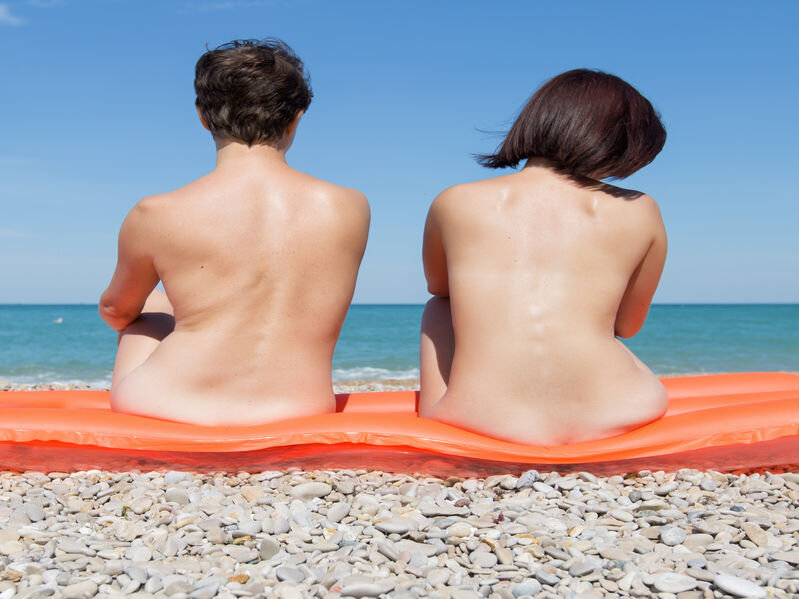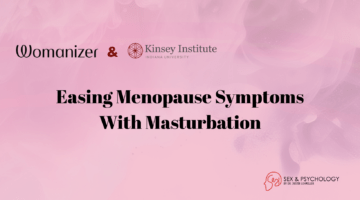Spending Time Naked With Strangers—In a Safe Space—Can Improve Body Image
October 26, 2020 by Justin Lehmiller
Nudism (also known as naturism) is a practice—and sometimes a lifestyle—that centers around non-sexual public nudity. As someone who grew up in the United States, I learned very early on in my life that this was taboo. I mean, whenever nudism was discussed or portrayed in the media, it was always the butt of the joke (pun intended). The impression I got was that no “normal” person would ever do this and that just being naked in front of other people is wrong, pathological, and perverted.
However, research tells us that getting naked with strangers in a safe setting probably isn’t harmful. In fact, contrary to all of the negative assumptions and stereotypes about nudism, there just might be some benefits to it.
In a recent article published in the Journal of Sex Research, researchers sought to understand how nude socialization is linked to people’s body image. Could spending time naked improve how people feel about their appearance or help them to appreciate their bodies more?
This paper presents the results of the first-ever randomized controlled trial of communal nudity. Specifically, 27 men and 24 women were recruited in London for an experiment in which they would “hang out” with others and, if desired, drink wine.
Participants were randomly divided into two groups. In the control condition, participants were told that “all you have to do is enjoy yourself in the company of the other participants.” In the naked (experimental) condition, participants were told to “(1) enjoy yourself in the company of the other participants and (2) do so naked. All participants are expected to disrobe for this part of the experiment.”
Note that this study was approved by a university ethics committee, the possibility of nudity was mentioned on the informed consent document, and participants were repeatedly told that they had the option of withdrawing at any time. In other words, people freely chose to take part in this study and they didn’t have to do anything they weren’t comfortable doing.
Participants in both conditions were further instructed to create a safe space by treating everyone else with “dignity and respect at all times” and they were told that offensive, inappropriate, and harassing behavior would not be tolerated.
After the study, participants completed a survey that included a measure of body appreciation (note that participants also completed a body appreciation survey before the socialization activity so that researchers could compare responses).
What they found was that, for participants in the naked condition, body image was significantly more positive at the end of the study than it was in the beginning. For those in the control condition, there was no significant change in body image.
Further, they found that “social physique anxiety” (anxious feelings about the way others look at your body) was lower for those in the naked condition, and that this accounted for the increase in body image reported by these participants.
In other words, communal nudity seemed to make people feel less anxious about how others viewed their bodies which, in turn, made them appreciate their own appearance even more.
Please note that this was a small study conducted in the UK with an almost all White sample, so we need to be mindful of the limitations. Thus, we shouldn’t assume that these results would necessarily generalize to other persons and cultures. Also, it’s possible that this study selected for those who had more experience with public nudity, or more willingness to try it in general, so they might not be representative of the broader population.
That said, these findings suggest that communal nudity—when it occurs in a safe space—has the potential to improve body image. This is an important finding because we know that negative body image is related to a number of problematic outcomes, including several mental health issues (e.g., depression, eating disorders), as well as sexual and relationship difficulties (e.g., avoidance of sex with one’s partner). Interventions that improve body image therefore have the potential to offer a number of positive downstream effects, although we clearly need more research to demonstrate this definitively.
Of course, this isn’t to suggest that communal nudity is the only way to improve body image or that nudity is necessarily the best approach for everyone. However, for those who are open to trying it, spending more time naked just might offer some psychological benefits.
Want to learn more about Sex and Psychology? Click here for previous articles or follow the blog on Facebook (facebook.com/psychologyofsex), Twitter (@JustinLehmiller), or Reddit (reddit.com/r/psychologyofsex) to receive updates. You can also follow Dr. Lehmiller on YouTube and Instagram.
To learn more about this research, see: West, K. (2020). I Feel Better Naked: Communal Naked Activity Increases Body Appreciation by Reducing Social Physique Anxiety. The Journal of Sex Research.
Image Source: 123RF/Oleksii Zabusik
You Might Also Like:

Dr. Justin Lehmiller
Founder & Owner of Sex and PsychologyDr. Justin Lehmiller is a social psychologist and Research Fellow at The Kinsey Institute. He runs the Sex and Psychology blog and podcast and is author of the popular book Tell Me What You Want. Dr. Lehmiller is an award-winning educator, and a prolific researcher who has published more than 50 academic works.
Read full bio >


